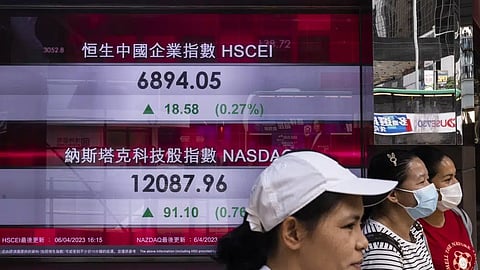

NEW YORK: Yields are rising in the U.S. bond market Friday following a highly anticipated report on the U.S. job market.
The US stock market is closed in observance of Good Friday, as are many markets across Europe. That leaves the U.S. bond market as one of the few open to react to the latest jobs update, which showed hiring lost a bit more momentum than expected last month but largely remained resilient.
The data was so anticipated because it could offer a big clue for the Federal Reserve, which faces a tough decision on interest rates that will affect the entire economy. Should it keep raising rates in order to drive down inflation that’s still high? Or should it hold off given all the signs of slowing across the economy and stress in the banking system that’s already been caused by the past year’s swift surge in rates?
The immediate reaction from the bond market Friday morning seemed to lean toward another hike. Not only did yields rise for Treasurys, so did bets for the Fed to raise rates by another quarter of a percentage point in May at its next meeting.
The yield on the 10-year Treasury climbed to 3.36% from 3.30% late Thursday, as of 9:30 a.m. Eastern time. The two-year yield, which tends to move more on expectations for the Fed, rose to 3.94% from 3.83%.
Friday’s jobs report showed that employers added 236,000 jobs last month, a slowdown from February’s 326,000 and slightly below economists’ expectations. Wages, meanwhile, grew 0.3% from February to match expectations. But year-over-year wage gains slowed to 4.2% from 4.6%.
A cooler job market is exactly what the Fed has been hoping for. Raising rates is one of the Fed’s most effective tools to undercut inflation, but it’s a notoriously blunt one that works only by slowing the entire economy. That raises the risk of a recession and hurts prices for stocks, bonds and other investments.
“The labor market is getting winded,” said Brian Jacobsen, senior investment strategist at Allspring Global Investments. “Payroll gains are still high, but the aggregate hours worked have fallen two months in a row. The payroll gains are not as broad-based as they used to be and hours are getting cut.”
Jacobsen said he doesn’t see reason for the Fed to hike rates based on the jobs report alone, and he said next week’s update on inflation may be more important.
Friday’s jobs report follows a string of reports on the economy this week that showed flagging momentum. A measure of health for the U.S. manufacturing industry contracted by its worst level since the summer of 2020, when the pandemic was wrecking the global economy. A separate measure of the U.S. services industries was weaker than expected, while employers posted fewer job openings across the country.
Many economists see a recession later this year or next as the most likely outcome. But some economists say a narrow possibility still exists where the Fed could raise rates just enough to get inflation fully under control without causing a severe recession.
Also complicating things for the Fed is the belief in the bond market that the central bank will have to cut interest rates later this year in order to prop up the economy.
Such cuts can act like steroids for financial markets and relax conditions for the economy, but they also can give inflation more oxygen. The Fed has so far consistently said it sees no rates cuts this year because it doesn’t want to let off the fight against inflation too early.
“Below-trend job growth and a modest rise in the unemployment rate is what the Fed is aiming for, but the weakening labor market supports the recession narrative and reinforce markets expectations of rate cuts,” said EY Chief Economist Gregory Daco.
Before the release of the U.S. jobs report, stocks rose across much of Asia.
Stocks in Shanghai gained 0.4%, Tokyo’s Nikkei 225 advanced 0.2% and the Kospi in Seoul rose 1.3%. Bangkok, Taiwan and Malaysia also gained.
Visit news.dtnext.in to explore our interactive epaper!
Download the DT Next app for more exciting features!
Click here for iOS
Click here for Android